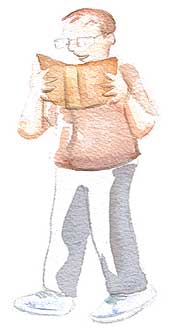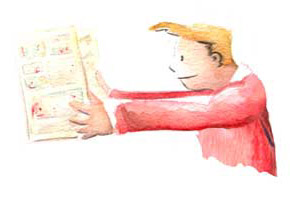Where do lyricists go when they're tired of love? Why, to the bookshelf…
1. The Seventh Seal - medieval apocalypse meets 60s crooning
OK, so The Seventh Seal is a film and not a book, but coming in 1957 from Swedish director Ingmar Bergman, I think it's highbrow enough to begin this piece. Scott Walker's imaginatively-titled fourth album 'Scott 4' begins with a straight adaptation of the film, imaginatively-titled 'The Seventh Seal'. What this seventh seal is I'm not entirely sure - something biblical - but the story is all about a post-crusading knight who's lost his faith, is losing his life and trying to win a game of chess with Death. Yeah, Death, the big man. Black hood, white face - also appeared in Bill & Ted's Bogus Journey, you might remember, where the titular dudes challenged the Reaper to play Twister instead. Serious as this original seems (and being surrounded by the plague must be no joke), there's some light relief from the knight's Squire Jons, who imparts such useful advice as "wherever you turn, your rump will always be behind you" - and much laughs too from the visionary travelling player who looks like a medieval Jasper Carrott. It's the best black and white Swedish-language film I've ever seen - but seriously, I recommend it. And the knight's called Antonius Block. How cool is that.
But before I saw the film on which it's based, Scott Walker's song seemed a lot better. It was as enticingly mysterious as the Beatles' 'Eleanor Rigby'. Now it's just a retelling of the film, though through the Walker croon, of course ("...the knight cried, 'NO! You've cheated mee..'"), it's got its own drama. And you have to applaud the choice of subject. Even Scott's disciple Jarvis hasn't put out a Pulp pop album informed by Soviet dictators, the Vietnam bereaved and Scandinavian religious allegory. Even in the 1960s, and in his easy-dramatic style, Scott Walker must've been so strange…
2. JD Salinger and screw-ups
Mark Chapman carried a copy of the book when he shot John Lennon. Belle & Sebastian advised us to give ourselves up to its allure. Indie-pop-types Airport Girl wrote 'Salinger Wrote' and Salinger wrote 'The Catcher in the Rye'. Trashy presenter Ruby Wax recently championed it too in the BBC's 'Big Read' , but both she and the book's narrator are modern Americans who open their vernacular mouths without thinking. Holden Caulfield can get away with it 'cos he's seventeen. And he's, oh, the embodiment of alienated youth, a (phony) phrase which would put a lot of people off reading the book who'd clearly relate to the guy. And what's the book all about? I heard it said Holden has a nervous breakdown; most days I exaggeratedly feel like him. It's not about much, I don't think, same as 'Withnail and I' doesn't have one driving theme but it's an overly-kickass film. It's about a lot, but without one plot. It goes off at tangents like a teenage Woody Allen. What should an intelligent lad do when he's expelled from school? Why is it the phony jocks that get to give girls the time, and never ask how they play checkers? And when the lake in Central Park gets frozen over, just where do the ducks go?
And mid-90s Scots lo-fi popsters The Secret Goldfish got their name here too.
3. Tom Paulin /
Tompaulin and the Beats
Tompaulin pseudo-famously called themselves after the poet and Irish bloke who's always on Newsnight Review with his mad staring eyes. The band are not so madly staringly intense, having had their doors opened by the not-so-twee-now Belle & Sebastian, but being B&S-types they do share a love for books and films. Their debut album 'The Town and the City' is the name of a Jack Kerouac book, and they pay tribute to not-as-famous fellow Beat writer 'Richard Brautigan' in a song of his same name. Brautigan's great, he uses language like a painter. Slap the colour all around and it can represent anything. He has one short story about a guy who replaces the plumbing in his house with various poetry, but can't bathe in Shakespeare; one about the house he was dared to go in as a kid cos they all thought a witch lived there; one about a pale marble movie... So in terms of Tompaulin I like the band's taste, but I can't decide if I like the song. Brautigan's last novel 'So the Wind Won't Blow It All Away' provides the chorus along with a recurring line from the book, "dust, American dust". The line keeps coming back in the book like a song in itself, on the radio wherever you go… it's a good line. But now I can't read it without hearing the Tompaulin song, and can't hear the song without thinking it a bit of a rip-off.
4. Bowie's own Big Brother
'Diamond Dogs' is something of a concept album and like all those,
of course, it's slightly dodgy; the single 'Rebel Rebel' ("hot
tramp!") the standout track. The main concept is of a dystopia.
George Orwell's most-famed work gets its own camp tribute ("Beware
the savage roar/of 1984!"), but 'Big Brother' seems based
on a more traditionally friendly figure -"someone to shave
us"?! - and is remembered as some sort of comedy sea-shanty.
And the record cover's just weird, David Bowie's weird head with the body
of a dog?
There are of course many more of these references to be spotted.. especially among those bookish indie types. But I've had enough for now. And what have I learned? That songwriters should stick with their own ideas if they don't want to piss off readers... fine to be inspired, but :
"if you must write prose and poems the words you use should be your own!"
Oops. I'm as guilty as anyone. Those words belong to The Smiths.
There's always someone somewhere with a big chin who knows...


